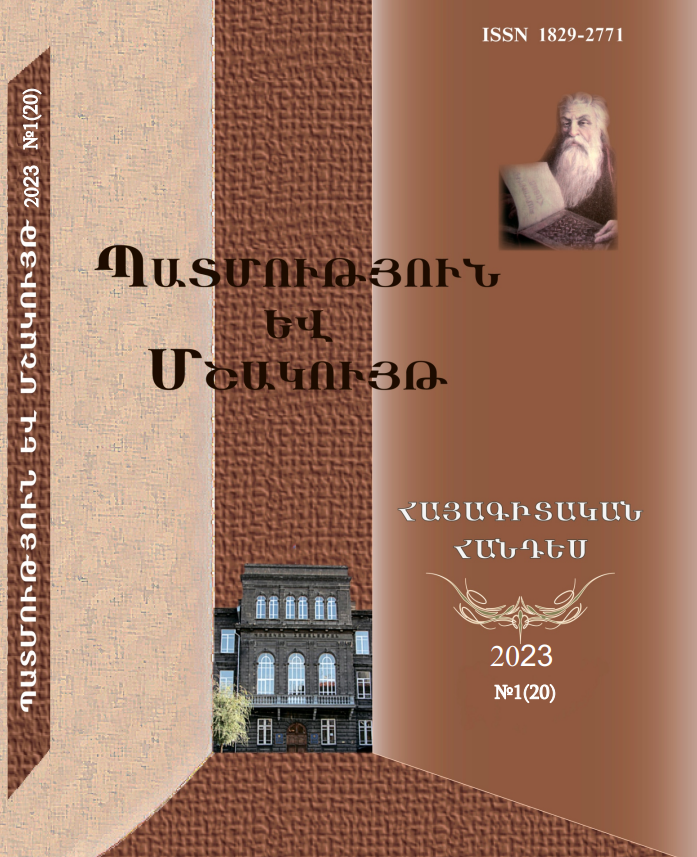Формирование и трансформация корейской идентичности
DOI:
https://doi.org/10.46991/hc.2023.20.2.150Ключевые слова:
Корейский полуостров, идентичность, нация, культура, система ценностей, конфуцианство, колониализмАннотация
В статье рассматриваются типология и понимания корейской идентичности. Рассматривается трансформация корейской идентичности под влиянием исторических процессов, особенно последствия политики Японии, которым они пытались ассимилировать корейскую нацию с японцами и предотвратить возрождение корейской идентичности, а потеря независимости вынудила корейский народ пойти по пути трансформации идентичности, впитывая западные и современные ценности. Также рассматриваются конфуцианские ценности как основа сознания корейской национальной идентичности. Анализируются корейские идентичности, выявляются сходства и особенности.
Библиографические ссылки
Գրականության ցանկ
Anderson B. (2006), Imagined Communities Reflections on the Origin and Spread of Nationalism, London, Verso, 240 p.
Armstrong C. (2004), The North Korean Revolution, 1945-1950, Cornell University Press, 265 p.
Chung Y. S. (2011), Identity Politics in the Democratic People’s Republic of Korea (DPRK), The Review of Korean Studies, Vol. 14, No. 3, 101-120 p.
Denney S., South Korean Identity: The Return of Ethnic Exclusivism?
https://sinonk.com/2016/10/28/south-korean-identity-the-return-of-ethnic-exclusivism/, 12.03.2023
Han K. K. (2003), The Anthropology of the Discourse on the Koreanness of Koreans, Korean Journal, Vol. 43, No. 1, 5-31 p.
Heo J. Y. (2020), Contentious Narratives on National Identity of South Korea: How to Understand the Self and the Significant Others, North Korea and the United States, Berlin, 303 p.
Hobsbawm E. (2012), Nations and nationalism since 1780: programme, myth, reality, Cambridge University Press, 206 p.
Hyung I. P. (2020), Constructing “Korean” Origins: A Critical Review of Archaeology, Historiography, and Racial Myth in Korean State-Formation Theories, Harvard University Asia Center, 543 p.
Kim A. S. (2022), Rebuilding Lost Identity: Rethinking Korean Reunification as an Imagined Community of Shared National Identity, UCLA Pacific Basin Law Journal, Vol. 39, No. 1, 61-98 p.
Kim J. (2014), National Identity and Attitudes Toward North Korean Defectors, Joint U.S.-Korea Academic Studies, Vol. 25, 95-111 p.
So K. (2012), The formation of the South Korean identity through national curriculum in the South Korean historical context: Conflicts and challenges, International Journal of Educational Development, Vol. 32, Issue 6, 797-804 p.
Villanueva O. (2020), Alternative Views: Korean Identity, College of East Asian Studies, Capstone, 1-25 p.
김종만, 김은기 (2020), 가치관을 통해 본 한국인의 문화적 정체성: 유교와 무교를 중심으로, 신학과 사회, 제34권 3호, 193-235
김정일 (1982), 주체사상에 대하여, 조선로동당출판사, 86
임형백 (2010), 한국인의 정체성의 다문화적 요소: 역사-인류학적 해석, 다문화와 평화, 제4 권 2 호, 10-43
References
Kim Jong Man, Kim Eungi (2020), Gachigwaneul tonghae bon hanguginui munhwajeong jeongcheseong: yugyowa mugyoreul jungsimeuro, Sinhakgwa sahoe, je34 gwon 3 ho, 193-235 (in Korean)
Kim Jeong Il (1982), Juchesasange daehayeo, Joseollodongdangchulpansa, 86 (in Korean)
Im Hyeong Baeng (2010), Hanguginui jeongcheseongui damunhwajeong yoso: yeoksa-illyuhakjeong haeseok, Damunhwawa pyeonghwa, je4 gwon 2 ho, 10-43 (in Korean)
Загрузки
Опубликован
Выпуск
Раздел
Лицензия
Copyright (c) 2023 Anna Tomeyan

Это произведение доступно по лицензии Creative Commons «Attribution-NonCommercial-ShareAlike» («Атрибуция — Некоммерческое использование — На тех же условиях») 4.0 Всемирная.

